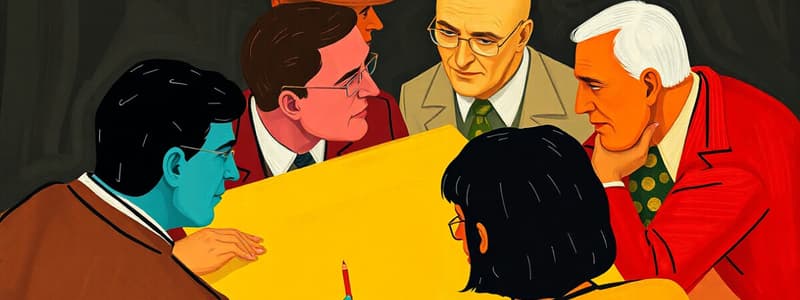Podcast
Questions and Answers
What is the role of a mindguard in a decision-making group?
What is the role of a mindguard in a decision-making group?
- To ensure all information is communicated transparently.
- To act as a devil's advocate during decision-making processes.
- To encourage open discussions among dissenting opinions.
- To filter and protect decision makers from certain information. (correct)
Which symptom of groupthink is illustrated when dissenting opinions are rationalized away?
Which symptom of groupthink is illustrated when dissenting opinions are rationalized away?
- Unanimity
- Self-Censorship
- Invulnerability
- Rationalization (correct)
What role does a mindguard play in the decision-making process?
What role does a mindguard play in the decision-making process?
- Promotes critical thinking among group members
- Protects decision makers from certain types of information (correct)
- Encourages open discussions and diverse viewpoints
- Facilitates the sharing of all relevant data
Which approach is critically important to prevent groupthink?
Which approach is critically important to prevent groupthink?
What best describes the effect of peer pressure in groupthink scenarios?
What best describes the effect of peer pressure in groupthink scenarios?
What is the focus of the Green Hat in the Six Thinking Hats method?
What is the focus of the Green Hat in the Six Thinking Hats method?
How does self-censorship contribute to the dynamics of groupthink?
How does self-censorship contribute to the dynamics of groupthink?
What is a likely consequence of the symptom of unanimity in groupthink?
What is a likely consequence of the symptom of unanimity in groupthink?
How should a leader contribute to mitigate groupthink during discussions?
How should a leader contribute to mitigate groupthink during discussions?
Which statement correctly describes the Black Hat role in decision-making?
Which statement correctly describes the Black Hat role in decision-making?
What is a primary characteristic of groupthink?
What is a primary characteristic of groupthink?
Which of the following is considered a precondition for groupthink?
Which of the following is considered a precondition for groupthink?
What symptom of groupthink involves decision-makers feeling beyond criticism?
What symptom of groupthink involves decision-makers feeling beyond criticism?
Which example illustrates the consequences of groupthink within an organization?
Which example illustrates the consequences of groupthink within an organization?
Which of the following does NOT typically contribute to groupthink?
Which of the following does NOT typically contribute to groupthink?
What behavior reflects the symptom of self-censorship in a groupthink scenario?
What behavior reflects the symptom of self-censorship in a groupthink scenario?
Which statement best describes the 'morality' symptom of groupthink?
Which statement best describes the 'morality' symptom of groupthink?
In the context of groupthink, what does rationalization involve?
In the context of groupthink, what does rationalization involve?
Flashcards
Mindguards
Mindguards
People who protect decision-makers from dissenting opinions or information that might challenge their decisions.
Groupthink Symptom: Invulnerability
Groupthink Symptom: Invulnerability
Decision-makers believe they are invincible, above criticism, and overly optimistic, leading to poor judgements.
Groupthink Symptom: Rationalization
Groupthink Symptom: Rationalization
Dismissing or justifying dissenting opinions as invalid or irrelevant.
Groupthink Symptom: Pressure
Groupthink Symptom: Pressure
Signup and view all the flashcards
Groupthink Symptom: Self-Censorship
Groupthink Symptom: Self-Censorship
Signup and view all the flashcards
Groupthink
Groupthink
Signup and view all the flashcards
Groupthink Precondition
Groupthink Precondition
Signup and view all the flashcards
Invulnerability (Groupthink)
Invulnerability (Groupthink)
Signup and view all the flashcards
Rationalization (Groupthink)
Rationalization (Groupthink)
Signup and view all the flashcards
Morality (Groupthink)
Morality (Groupthink)
Signup and view all the flashcards
Stereotyping (Groupthink)
Stereotyping (Groupthink)
Signup and view all the flashcards
Pressure (Groupthink)
Pressure (Groupthink)
Signup and view all the flashcards
Self-Censorship (Groupthink)
Self-Censorship (Groupthink)
Signup and view all the flashcards
Six Thinking Hats
Six Thinking Hats
Signup and view all the flashcards
Devil's Advocate
Devil's Advocate
Signup and view all the flashcards
Neutral Leader
Neutral Leader
Signup and view all the flashcards
Study Notes
Organizational Theory: Groupthink
- Groupthink is a phenomenon where group members prioritize maintaining harmony and cohesiveness over critical evaluation of ideas. This often results in poor and potentially harmful decision-making.
- Humans get trapped in a web of their own creations, organizations and their members are trapped in their own realities and ways of thinking.
- Groupthink examples include:
- The Japan auto industry in the 1970s: North American automakers underestimated the competition from fuel-efficient Japanese cars.
- Blockbuster's inability to adapt to Netflix.
- Kodak's failure to embrace digital photography.
- Key elements of Groupthink:
- High cohesiveness: Little critical judgment and weak opposition.
- Isolation: Groups insulated from external feedback or diverse viewpoints.
- Embedded values: Pre-existing organizational or group values.
- Lack of diversity of thought: Similar backgrounds or experiences in the group.
- Directive leadership: Leaders with very strong opinions can stifle debate.
- Desire for group belonging: Fear of being excluded or ostracized.
- Preconditions of groupthink lead to poor and potentially immoral decisions.
- High cohesiveness.
- Stressful and demanding environment.
- Established group values deeply entrenched.
- Lack of diversity of ideas.
- Directive leadership.
- Desire for group belonging.
- The 'Old Boys Club' mentality.
Symptoms of Groupthink
- Invulnerability: Decision-makers are overconfident and believe in the group's invincibility.
- Rationalization: Dismiss or rationalize any negative opinions or data that contradict the group.
- Stereotyping: Negative judgments of people or groups outside of the organization.
- Morality: The group believes its decisions are inherently moral and just, even if not.
- Pressure on dissenters: Leaders or powerful members pressure any dissenters to conform.
- Self-censorship: Members fail to express dissenting opinions due to fear.
- Unanimity illusion: The assumption that everyone agrees within the group (even if silent).
- Mindguards: Members protect leaders from negative viewpoints.
Avoiding Groupthink
- Educate members on groupthink pitfalls.
- Use "Thinking Hats" (Six Thinking Hats technique): Encourage diverse perspectives. Include Devil's advocate.
- Increased awareness of all perspectives, including causes, consequences -- engage stakeholders.
- Conduct thorough risk assessments to uncover hidden issues.
- Use outside experts or audit teams to evaluate issues.
- Have different groups analyze the same issue.
- Should have leaders of decision-making groups act as neutral facilitators.
- Encourage contrasting opinions and diverse perspectives.
- Hold multiple discussion meetings before making a final decision.
- Discuss intended decision with stakeholders before implementation.
Groupthink: Six Thinking Hats
- White Hat: Factual data, figures, and information.
- Black Hat: Critical judgments, possible problems, potential dangers.
- Red Hat: Emotions, gut feelings, intuition, hunches, ideas.
- Blue Hat: Organization of thought process, strategies for evaluating ideas, guiding the discussion.
- Yellow Hat: Possibilities, advantages, benefits, and opportunities.
- Green Hat: Creativity and new ideas, alternative solutions.
Jonestown Case
- Groupthink is showcased in the Jonestown tragedy through the following factors:
- Cult leader's charismatic authority.
- Isolation and manipulation of followers.
- Fear of reprisal for opposing Jim Jones or leaving.
- Powerful and constant pressure to conform.
- Creating a fabricated external enemy to unite group members.
- False sense of unity and purpose.
Studying That Suits You
Use AI to generate personalized quizzes and flashcards to suit your learning preferences.




